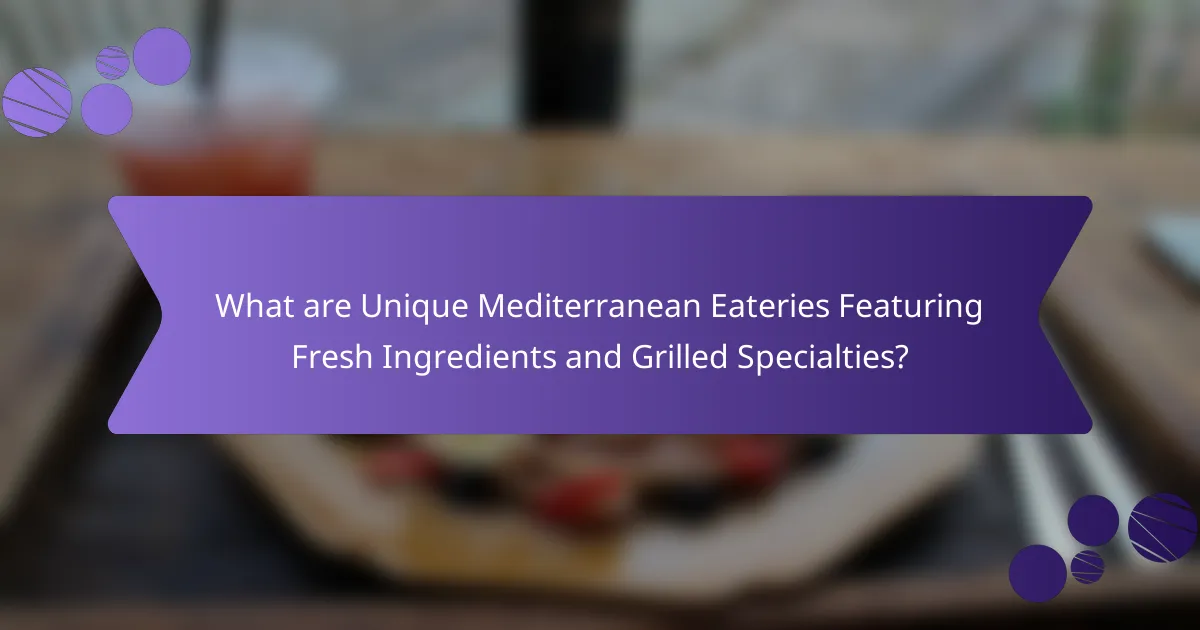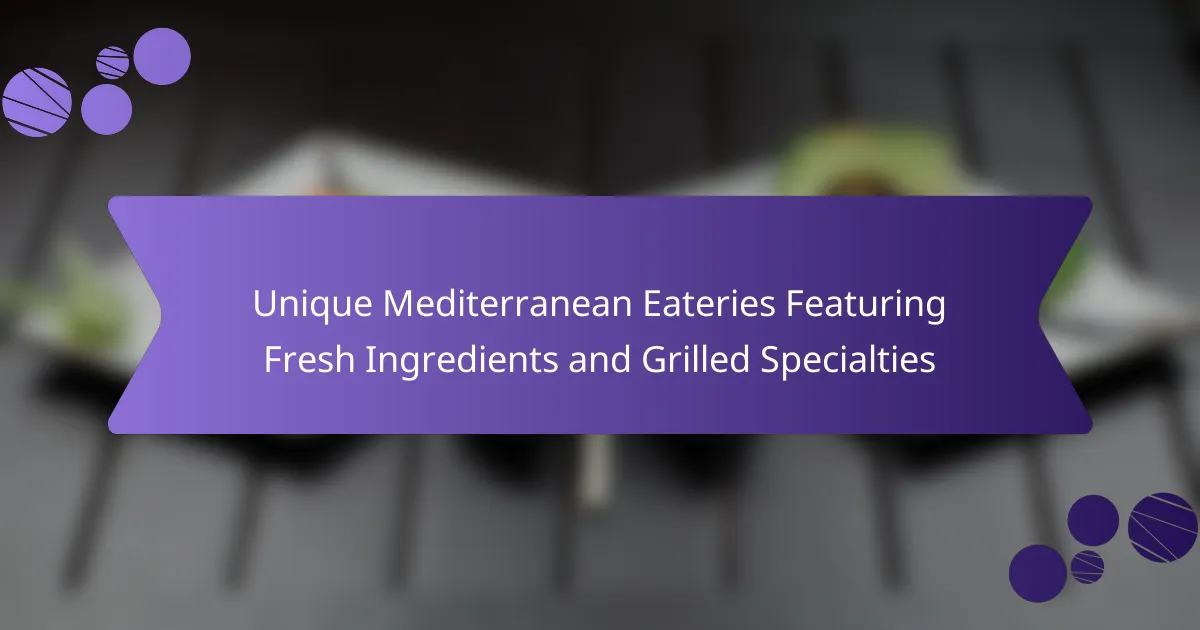
What are Unique Mediterranean Eateries Featuring Fresh Ingredients and Grilled Specialties?
Unique Mediterranean eateries featuring fresh ingredients and grilled specialties include establishments like Taberna de Haro and Olio e Limone. These restaurants focus on using seasonal produce and high-quality meats. They often offer dishes such as grilled octopus, lamb skewers, and fresh vegetable salads. Many of these eateries emphasize traditional cooking methods, enhancing the flavors of their grilled offerings. Locations like these frequently source ingredients from local farms. This practice ensures freshness and supports the regional economy. Additionally, Mediterranean cuisine is known for its health benefits, including heart-healthy fats and antioxidants. The vibrant flavors and emphasis on grilling make these eateries stand out in the culinary landscape.
How do these eateries distinguish themselves from traditional Mediterranean restaurants?
These eateries distinguish themselves from traditional Mediterranean restaurants by emphasizing unique grilling techniques. They often utilize high-quality, locally sourced ingredients for freshness. This focus on fresh produce enhances the flavor profile of their dishes. Additionally, they may incorporate innovative recipes that blend Mediterranean flavors with local culinary traditions. Some eateries also offer a more casual dining atmosphere compared to traditional settings. Their menus frequently feature seasonal items that change regularly, reflecting local harvests. This approach attracts diners seeking a modern twist on classic Mediterranean cuisine.
What unique culinary practices are commonly found in these eateries?
Unique culinary practices in Mediterranean eateries include the use of fresh, locally sourced ingredients. These establishments often emphasize seasonal produce, enhancing flavor and nutritional value. Grilling is a prevalent cooking method, imparting a distinct smoky flavor to meats and vegetables. Many eateries also feature traditional techniques, such as marinating meats in olive oil and herbs before grilling.
Additionally, communal dining is common, encouraging sharing of various dishes. This practice fosters a social atmosphere and highlights a variety of flavors. Many Mediterranean eateries also incorporate unique spice blends, such as za’atar or harissa, to elevate dishes.
Furthermore, the preparation of dishes like mezze showcases a range of small plates, allowing for diverse tasting experiences. The focus on simplicity and quality aligns with the Mediterranean diet, which is known for its health benefits. These practices collectively create a distinctive culinary experience unique to Mediterranean eateries.
How do fresh ingredients enhance the dining experience in these establishments?
Fresh ingredients significantly enhance the dining experience in unique Mediterranean eateries. They provide superior flavor and texture in dishes. Fresh produce retains more nutrients, contributing to healthier meals. The vibrant colors of fresh ingredients create visually appealing presentations. Seasonal ingredients reflect local culture and traditions, enriching the dining experience. Studies show that meals made with fresh ingredients can improve customer satisfaction. For example, a survey by the National Restaurant Association found that 70% of diners prefer restaurants that emphasize fresh, local produce. This preference drives repeat visits and customer loyalty in Mediterranean establishments.
What types of grilled specialties are commonly offered in these eateries?
Common grilled specialties in Mediterranean eateries include kebabs, souvlaki, and grilled fish. Kebabs are often made with marinated meat, skewered and grilled to perfection. Souvlaki typically consists of small pieces of meat grilled on a skewer, often served with pita. Grilled fish, such as sea bass or sardines, is frequently seasoned with herbs and olive oil. These dishes highlight the freshness of ingredients, a hallmark of Mediterranean cuisine. Many eateries also offer grilled vegetables, enhancing the meal’s flavor and nutritional value. Grilled specialties are popular due to their smoky flavor and appealing presentation.
Which grilling techniques are most popular in Mediterranean cuisine?
The most popular grilling techniques in Mediterranean cuisine include direct grilling, skewering, and using a charcoal grill. Direct grilling involves cooking food over high heat for a short time. This method enhances the flavors of meats and vegetables. Skewering, often seen in dishes like kebabs, allows for even cooking and easy handling. Charcoal grilling adds a distinct smoky flavor, common in many Mediterranean regions. These techniques are rooted in tradition and emphasize fresh, high-quality ingredients. The use of olive oil, herbs, and spices complements the grilled items, making them a staple in Mediterranean dining.
What are some signature grilled dishes that define these eateries?
Signature grilled dishes defining unique Mediterranean eateries include souvlaki, kebabs, and grilled octopus. Souvlaki consists of marinated meat skewered and grilled, commonly served with pita and tzatziki. Kebabs, originating from various Mediterranean regions, feature spiced meat grilled on skewers, often accompanied by fresh vegetables. Grilled octopus is a delicacy in coastal areas, known for its tender texture and smoky flavor, typically seasoned with olive oil and lemon. These dishes highlight the use of fresh ingredients and traditional grilling techniques, essential to Mediterranean cuisine.
Why is the use of fresh ingredients important in Mediterranean cuisine?
The use of fresh ingredients is vital in Mediterranean cuisine for enhancing flavor and nutritional value. Fresh ingredients provide vibrant tastes that are characteristic of this culinary style. They also contribute essential nutrients, promoting health benefits. Mediterranean cuisine emphasizes seasonal produce, which ensures optimal freshness and quality. Research shows that diets rich in fresh fruits and vegetables can reduce the risk of chronic diseases. Additionally, the Mediterranean diet is known for its heart-healthy properties, largely attributed to fresh ingredients. This focus on freshness aligns with traditional cooking practices in the region. Overall, fresh ingredients are foundational to the authenticity and healthfulness of Mediterranean dishes.
How do seasonal ingredients influence menu offerings?
Seasonal ingredients significantly influence menu offerings by dictating the freshness and variety of dishes available. Chefs often design menus around ingredients that are at their peak during specific seasons. This approach enhances flavor and nutritional value in meals. For instance, summer menus may feature ripe tomatoes and fresh herbs, while winter menus might highlight root vegetables and hearty greens. Seasonal sourcing also supports local agriculture, reducing transportation costs and environmental impact. Research indicates that restaurants using seasonal ingredients tend to attract more customers due to the perceived quality and authenticity of their offerings. Thus, seasonal ingredients play a crucial role in shaping diverse and appealing menu options.
What role do local sourcing and sustainability play in these eateries?
Local sourcing and sustainability are crucial in unique Mediterranean eateries. These practices enhance food quality and support local economies. Sourcing ingredients locally ensures freshness and reduces transportation emissions. This approach often leads to seasonal menus that reflect regional flavors. Sustainability practices also include minimizing waste and using eco-friendly materials. Many eateries engage in responsible fishing and farming practices. This commitment attracts environmentally conscious customers. Research indicates that 70% of consumers prefer restaurants that prioritize sustainability.

How do Unique Mediterranean Eateries cater to diverse dietary preferences?
Unique Mediterranean eateries cater to diverse dietary preferences by offering a wide range of menu options. These eateries typically include vegetarian and vegan dishes, such as hummus, falafel, and stuffed grape leaves. They also provide gluten-free options, allowing those with gluten sensitivities to enjoy their meals. Many Mediterranean dishes are naturally low in dairy, accommodating lactose-intolerant customers.
Additionally, these eateries often highlight fresh ingredients, which appeal to health-conscious diners. Grilled specialties, like seafood and lean meats, offer protein-rich choices for various diets. Customization is common, enabling patrons to modify dishes according to their dietary needs. This adaptability makes Mediterranean cuisine accessible to a broad audience, ensuring everyone can find something enjoyable.
What vegetarian and vegan options are available in these eateries?
Unique Mediterranean eateries offer a variety of vegetarian and vegan options. Common vegetarian choices include grilled vegetable skewers, stuffed grape leaves, and falafel. Vegan options often feature dishes like hummus, baba ganoush, and tabbouleh salad. Many eateries also provide seasonal vegetable dishes and lentil soups. These options highlight fresh ingredients typical of Mediterranean cuisine. The use of herbs and spices enhances the flavors without the need for animal products. Many Mediterranean restaurants cater to dietary preferences by clearly marking vegetarian and vegan items on their menus. This ensures diners can easily identify suitable meals.
How do these eateries adapt traditional dishes for plant-based diets?
Eateries adapt traditional Mediterranean dishes for plant-based diets by substituting animal products with plant-based alternatives. For example, they replace cheese with nut-based cheeses in dishes like spanakopita. Meat is often substituted with legumes or grilled vegetables in kebabs and stews. These eateries also incorporate a variety of grains, such as quinoa or farro, to enhance texture and nutrition. Traditional sauces are modified to be dairy-free, using olive oil and herbs instead of cream. Seasonal vegetables are emphasized, showcasing local produce in classic recipes. This approach maintains the essence of Mediterranean cuisine while catering to plant-based preferences.
What are some popular vegetarian and vegan grilled specialties?
Popular vegetarian and vegan grilled specialties include vegetable skewers, grilled portobello mushrooms, and stuffed bell peppers. Vegetable skewers often feature zucchini, bell peppers, and cherry tomatoes. Grilled portobello mushrooms serve as a meat substitute due to their rich flavor and texture. Stuffed bell peppers are commonly filled with quinoa, black beans, and spices before grilling. Additionally, grilled eggplant and zucchini rolls are popular choices, often filled with vegan cheese or herbs. These dishes highlight fresh ingredients and are commonly found in Mediterranean cuisine. Grilling enhances the natural flavors of these vegetables, making them a favorite among plant-based eaters.
How do these eateries accommodate gluten-free diners?
These eateries accommodate gluten-free diners by offering dedicated gluten-free menu options. They often use separate cooking areas to prevent cross-contamination. Many establishments provide gluten-free substitutes for traditional dishes. For example, they may offer gluten-free pasta or bread. Staff are usually trained to understand gluten-free requirements. Some eateries also highlight gluten-free dishes on their menus. They may source local ingredients that are naturally gluten-free. This approach ensures a safe dining experience for gluten-sensitive customers.
What gluten-free options are typically available on the menu?
Gluten-free options typically available on the menu include salads, grilled meats, and seafood dishes. Many Mediterranean eateries offer fresh vegetable salads that are naturally gluten-free. Grilled chicken, lamb, and fish are often prepared without gluten-containing marinades. Additionally, rice or quinoa dishes serve as gluten-free sides. Some establishments provide gluten-free pasta alternatives. Soups made from broth and vegetables can also be gluten-free. Always check for gluten-free labels on sauces and dressings. These options cater to dietary restrictions while maintaining Mediterranean flavors.
How do these establishments ensure cross-contamination is avoided?
These establishments ensure cross-contamination is avoided by implementing strict food safety protocols. They designate separate areas for raw and cooked foods. Staff members use different utensils and cutting boards for various food types. Regular training on hygiene practices is provided to all employees. They also maintain proper storage practices, using sealed containers for ingredients. Frequent cleaning and sanitizing of surfaces and equipment further reduce risks. Compliance with local health regulations is strictly observed. These measures collectively help maintain food safety and protect customers.

What are the dining experiences like at Unique Mediterranean Eateries?
Dining experiences at Unique Mediterranean Eateries are characterized by vibrant flavors and fresh ingredients. Guests often enjoy a diverse menu featuring grilled specialties, seafood, and vegetable dishes. The ambiance is typically warm and inviting, enhancing the overall dining experience. Many eateries emphasize traditional cooking methods, such as grilling over open flames. This approach preserves the natural flavors of the ingredients. Additionally, the use of herbs and spices is prominent, contributing to the Mediterranean cuisine’s distinct taste. Many establishments also offer outdoor seating, allowing diners to enjoy their meals in a pleasant atmosphere. Overall, the combination of fresh ingredients, skilled preparation, and inviting settings creates memorable dining experiences.
How does the ambiance contribute to the overall experience?
Ambiance significantly enhances the overall dining experience in unique Mediterranean eateries. A welcoming atmosphere sets the tone for enjoyment and relaxation. Elements like lighting, decor, and music create a sensory environment that complements the meal. For instance, warm lighting can evoke comfort, while traditional Mediterranean decor can immerse diners in cultural authenticity. Research shows that ambiance influences mood and perception of food quality. A study published in the Journal of Consumer Research indicates that pleasant surroundings can increase customer satisfaction and perceived value. Thus, the ambiance plays a crucial role in shaping diners’ experiences and enjoyment of fresh ingredients and grilled specialties.
What design elements are commonly found in these eateries?
Common design elements in unique Mediterranean eateries include open layouts and natural light. These spaces often feature rustic wooden furniture and vibrant color palettes. Additionally, decorative tiles and mosaics are frequently used to enhance visual appeal. Many eateries incorporate greenery, such as potted plants or herb gardens, to emphasize freshness. Authentic Mediterranean artwork often adorns the walls, showcasing cultural heritage. Outdoor seating areas are common, promoting al fresco dining experiences. Warm lighting creates an inviting atmosphere, making diners feel comfortable. These elements collectively reflect the Mediterranean lifestyle and culinary traditions.
How does music and service style enhance the dining atmosphere?
Music and service style significantly enhance the dining atmosphere by creating an immersive experience. Music sets the mood, influencing emotions and perceptions. For instance, upbeat music can energize diners, while soft melodies can promote relaxation. Studies show that background music can affect dining duration and spending. Service style also plays a crucial role in customer satisfaction. Attentive and friendly service makes guests feel valued and comfortable. This, in turn, encourages longer visits and repeat patronage. Together, music and service style create a cohesive environment that enhances the overall dining experience.
What are the best practices for enjoying a meal at a Unique Mediterranean Eatery?
To enjoy a meal at a Unique Mediterranean Eatery, start by selecting dishes that showcase fresh ingredients. Mediterranean cuisine emphasizes the use of high-quality, seasonal produce. Opt for grilled specialties, which are a hallmark of this culinary tradition. Pair your meal with traditional beverages like fresh mint tea or local wines. Sharing plates enhances the communal dining experience, a common practice in Mediterranean culture. Take time to savor each dish, appreciating the flavors and textures. Consider the ambiance, as many eateries focus on creating a welcoming atmosphere. Engaging with staff about menu recommendations can enhance your experience. These practices contribute to a fulfilling dining experience at a Unique Mediterranean Eatery.
How can diners choose the best dishes for their preferences?
Diners can choose the best dishes for their preferences by considering their tastes, dietary restrictions, and ingredient freshness. Identifying personal flavor profiles helps in selecting suitable options. Diners should review menus for descriptions that match their likes. Asking staff for recommendations can provide insights into popular dishes. Exploring seasonal ingredients ensures freshness and quality. Research shows that diners who engage with the menu tend to enjoy their meals more. A study by the Journal of Culinary Science and Technology found that informed diners are more satisfied with their choices.
What tips can enhance the overall dining experience in these eateries?
To enhance the overall dining experience in unique Mediterranean eateries, consider the following tips. First, selecting fresh, seasonal ingredients elevates the flavor profile of dishes. Studies show that freshness directly impacts taste quality. Second, opting for grilled specialties can provide a unique smoky flavor that complements Mediterranean cuisine. Grilling enhances the natural flavors of meats and vegetables. Third, pairing meals with appropriate wines enhances the overall flavor experience. Research indicates that wine can complement food and improve taste perception. Fourth, engaging with the staff can lead to personalized recommendations and a more enjoyable atmosphere. Friendly service has been linked to increased customer satisfaction. Finally, take time to appreciate the ambiance and presentation of dishes, as these elements contribute to the overall dining experience.
Unique Mediterranean eateries are characterized by their focus on fresh ingredients and grilled specialties, offering dishes like grilled octopus, lamb skewers, and seasonal vegetable salads. These establishments distinguish themselves through innovative grilling techniques and the use of locally sourced produce, enhancing flavor and supporting local economies. The article explores unique culinary practices, the importance of fresh ingredients, and how these eateries cater to diverse dietary preferences, including vegetarian, vegan, and gluten-free options. Additionally, it examines the dining experiences, ambiance, and best practices for enjoying meals in these vibrant culinary spaces.


